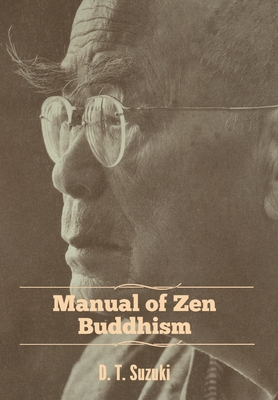

 Bibliotech Press
Bibliotech Press
Manual of Zen Buddhism


Key Metrics
- Daisetz Teitaro Suzuki
- Bibliotech Press
- Hardcover
- 9781618957122
- 9.02 X 5.98 X 0.5 inches
- 0.88 pounds
- Body, Mind & Spirit > Spiritualism - General
- English
 Secure Transaction
Secure TransactionBook Description
Daisetsu Teitaro Suzuki (18 October 1870 - 12 July 1966) was a Japanese author of books and essays on Buddhism, Zen (Chan) and Shin that were instrumental in spreading interest in both Zen and Shin (and Far Eastern philosophy in general) to the West. Suzuki was also a prolific translator of Chinese, Japanese, and Sanskrit literature. Suzuki spent several lengthy stretches teaching or lecturing at Western universities, and devoted many years to a professorship at Ōtani University, a Japanese Buddhist school.
He was nominated for the Nobel Peace Prize in 1963.
Suzuki's books have been widely read and commented on by many important figures. A notable example is An Introduction to Zen Buddhism, which includes a 30-page commentary by famous analytical psychologist Carl Jung, who wrote of Suzuki:
Suzuki's works on Zen Buddhism are among the best contributions to the knowledge of living Buddhism. We cannot be sufficiently grateful to the author, first for the fact of his having brought Zen closer to Western understanding, and secondly for the manner in which he has achieved this task.
But Jung was also critical, warning against an uncritical borrowing from Asian spirituality. (wikipedia.org)
Author Bio
Daisetz Teitaro Suzuki (1870-1966) was a Japanese translator, teacher, and constructive interpreter of Zen Buddhist thought to the West.
Choosing belief over doubt has profound, eternal consequences for practicing Christians, while for religious Jews and Moslems alike, faith in God is the cornerstone of righteousness. Yet elsewhere in the world, revered spiritual traditions exist in which the struggle between belief and unbelief is of little importance. Daisetz Teitaro Suzuki is an eloquent international spokesman for one of these traditions: the Japanese variant of Buddhism known as Zen.
A widely traveled Japanese scholar, Suzuki taught in that country's university system, translated several Eastern philosophical works into English, and corresponded widely with Christian contemplatives such as Thomas Merton. Through his books and lectures, Suzuki became Zen's leading voice in America during the mid-20th century. His Introduction to Zen Buddhism, published in 1956, not only offers an overview of the historical background of Zen philosophy and practice, but succeeds in conveying something of its seemingly inexpressible essence.
Source: Pbs.org and Encyclopedia.com
Videos
No Videos
Community reviews
Write a ReviewNo Community reviews